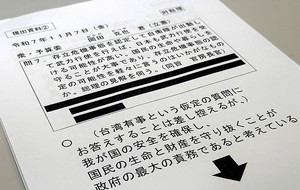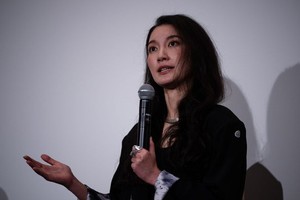By RINA HORIKOSHI/ Staff Writer
April 1, 2025 at 16:41 JST
Disgraced celebrity Masahiro Nakai sexually assaulted a former announcer at Fuji Television Network Inc. in a “work-related” incident, and the broadcaster’s appalling response was like a second attack, a third-party investigative committee concluded.
The committee, chaired by lawyer Akira Takeuchi, was set up by Fuji TV and its parent company, Fuji Media Holdings Inc., to investigate how the companies handled the case.
In its report released on March 31, the committee concluded that sexual harassment has been rampant throughout the company. And this atmosphere of tolerance for inappropriate behavior set the stage for the assault.
The report revealed that the victim of Nakai’s sexual violence was a Fuji TV announcer at the time.
In May 2023, she attended a dinner party on the invitation of a senior executive in Fuji TV’s programming department. Several people were there, including Nakai, according to the report.
Two days later, on June 2, Nakai invited the announcer to dinner. While alone with her there, Nakai sexually assaulted the woman, the report said.
The committee determined the incident was connected with the victim’s job because “there was an ongoing business relationship” between the two.
Nakai contacted the producer of his program in July 2023 and explained that he was having “trouble” with the woman, the report said.
He tried to give 1 million yen ($6,671) to the woman through the producer as a “get-well money,” but she refused to accept it, and the money was returned to Nakai, according to the report.
Around this time, the woman was diagnosed with post-traumatic stress disorder.
The committee’s report severely criticized the series of responses by top executives of Fuji TV. It said they lacked an understanding of sexual violence and had little perspective on how to help the victim.
Nakai’s attack was reported to then-President Koichi Minato and then-Director Toru Ota in August 2023. However, they “immediately concluded” that it was “private trouble between a man and a woman.”
“The company made an error in recognizing and assessing the risk and did not take any measures as part of the company’s crisis management,” the report said.
Although Fuji TV decided to remove the woman from her TV program while she was recovering from “illness,” it allowed Nakai to continue appearing on its programs.
The report said the company’s actions, which were intended for the benefit of Nakai, “fall under the definition of secondary victimization.”
The committee said it also investigated the nature of Fuji TV’s meetings with its business partners. The report noted “inappropriate” behavior, including the company’s practice of inviting women to the meetings specifically to win the business partners’ favor.
The committee’s report described Fuji TV as having “a corporate culture that tolerates harassment” and failing to conduct thorough investigations even after problems arise.
Fuji TV President Kenji Shimizu apologized at a news conference after the report was released.
“As a result of the company’s insufficient relief efforts, the victim greatly suffered,” he said.
Regarding the inappropriate meetings with business partners cited in the report, Shimizu said, “We will take disciplinary action after confirming the facts.”
The Asahi Shimbun asked a representative for Nakai to comment on the report, but no response was received by 7 p.m. on March 31.
Nakai, 52, rose to fame as a member of the now-disbanded idol group SMAP.
He announced his retirement from show business in January this year after weekly magazines reported about the assault against the woman.
In response to the reports, Fuji TV executives held news conferences that provided few details and fueled speculation the company was just trying to protect itself.
The third-party committee was set up on demands from shareholders and after the broadcaster lost advertisers.




















A peek through the music industry’s curtain at the producers who harnessed social media to help their idols go global.
A series based on diplomatic documents declassified by Japan’s Foreign Ministry
Here is a collection of first-hand accounts by “hibakusha” atomic bomb survivors.
Cooking experts, chefs and others involved in the field of food introduce their special recipes intertwined with their paths in life.
A series about Japanese-Americans and their memories of World War II